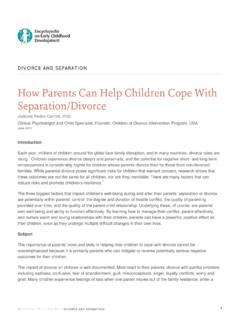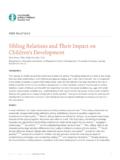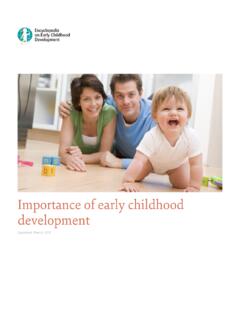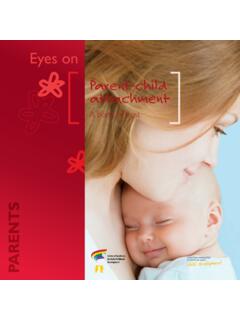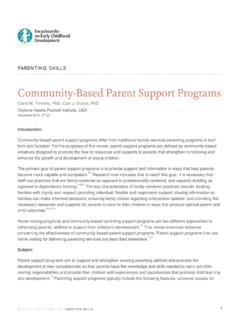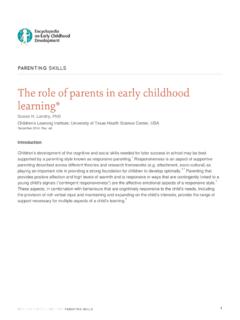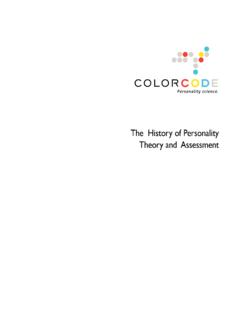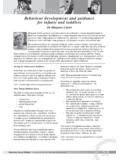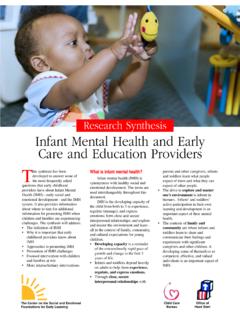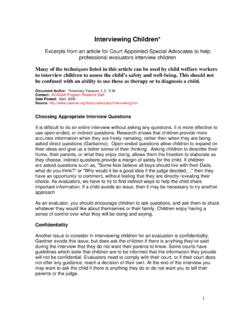Transcription of Prosocial behaviour - Encyclopedia on Early Childhood ...
1 Prosocial behaviourUpdated: February 2016 Topic Editor :Prof. Ariel Knafo-Noam, The Hebrew University of Jerusalem, IsraelTable of contentsSynthesis 5 Prosocial Development Across the Lifespan 7 STUART I. HAMMOND, PHD, CELIA A. BROWNELL, PHD, NOVEMBER 2015 Individual Differences in Prosociality: The Roles of Parenting, temperament , and Genetics 13 ARIEL KNAFO-NOAM, PHD, NOAM MARKOVITCH, DOCTORAL STUDENT, NOVEMBER 2015 Socio-Cognitive Correlates of Prosocial behaviour in Young Children 21 TRACY L. SPINRAD, PHD,SARAH VANSCHYNDEL, MA, DOCTORAL STUDENT, MAY 2015 The Moral Foundations of Prosocial behaviour 27 TINA MALTI, PHD, SEBASTIAN P. DYS, MA, ANTONIO ZUFFIAN , PHD, MAY 2015 Prosocial behaviour Towards Ingroup and Outgroup Members 32 GIL DIESENDRUCK, PHD, AVI BENOZIO, MA, DOCTORAL STUDENT, MAY 2015 How Evolutionary Theory and Neuroscience Contribute to Understanding the Development of Prosociality: Commentary 37 JEAN DECETY, PHD, FEBRUARY 2016 Empathy, Prosocial behaviour and Adjustment: Clinical Aspects of Surfeits and Deficits in Concern for Others 42 CAROLYN ZAHN-WAXLER, PHD, ANDREW SCHOEN, BS, FEBRUARY 2016 School Intervention and Prosocial behaviour 52 ASHA L.
2 SPIVAK, PHD, RESEARCH ASSOCIATE, JOSEPH A. DURLAK, PHD, EMERITUS PROFESSOR OF PSYCHOLOGY, FEBRUARY 2016 Prosocial behaviour and Schooling 57 KATHRYN WENTZEL, PHD, MAY 2015 2015-2018 CEECD / SKC-ECD | Prosocial BEHAVIOUR2222222222222222222222222222222 222222222222222222222222222222 2015-2018 CEECD / SKC-ECD | Prosocial BEHAVIOUR3333333333333333333333333333333 333333333333333333333333333333 Topic funded by 2015-2018 CEECD / SKC-ECD | Prosocial BEHAVIOUR4444444444444444444444444444444 444444444444444444444444444444 SynthesisWhy is it important? Prosocial behaviours refer to voluntary actions specifically intended to benefit or improve the well-being of another individual or group of individuals. Examples of such behaviours include helping, sharing, consoling, comforting, cooperating, and protecting someone from any potential harm.
3 From an evolutionary perspective, Prosocial behaviours may have evolved from a biological adaptation to living in society. The development of Prosocial behaviours is important during the Early years as these actions are associated with social and emotional competence throughout Childhood ( , peer acceptance, empathy, self-confidence, and emotion-regulation skills). Furthermore, Prosocial behaviours are associated with academic performance, and the development of cognitive competencies, such as problem-solving and moral reasoning, all of which are contributing to a positive school do we know?Manifestations of Prosocial behaviours emerge at a young age, and the same basic forms are found across cultures. Even 18-month-old infants demonstrate Early forms of Prosocial behaviours ( , when they point an out-of-reach object or an unseen event to an adult).
4 Around the ages of 3 and 4, children s Prosocial behaviours increase in complexity. They respond more readily to others negative emotional state with appropriate sharing, helping, and/or comforting. During this developmental period, children also start to demonstrate in-group favouritism, which is manifested by a tendency to exhibit more Prosocial behaviours towards individuals who belong to the same group ( , based on perceived similarity, such as race and gender) than members of the out-group. Yet, as children develop more advanced socio-cognitive skills and spend more time interacting with their peers, they become increasingly aware of the reasons why it is important to help others, which in turn motivate them to engage in Prosocial factors predict and/or reinforce Prosocial behaviours in young children, in addition to genetic differences that account in part for individual differences.
5 Early moral development during the first five years of life is an important foundation for Prosocial behaviours . For instance, children who experience guilt following transgressions are more likely to engage in Prosocial behaviours relative to those who do not, as they are increasingly aware of the consequences of their actions for the self and for others. Children s Prosocial behaviours are also influenced by feelings of empathy and the desire to help others. While there is a general consensus that empathy is an important predictor of children s Prosocial behaviours , extremes forms of empathy - either surfeits or deficits - may increase the risk of developing psychological problems later on. For example, young children who express extreme concerns for their parents well-being ( , due to marital conflicts or health problems) have been found to be at increased risk of developing anxiety or depression as they grow up.
6 In contrast, young children s absence of reaction and/or inappropriate reactions to someone s distress (laughter, enjoyment) may be a precursor of behavioural difficulties. However, it is important to keep in mind that the expression of empathy falls on a continuum and is influenced not only by the child s 2015-2018 CEECD / SKC-ECD | Prosocial BEHAVIOUR5555555555555555555555555555555 555555555555555555555555555555characteri stics but also by the environment he/she is exposed to. Finally, parent and peer socialization play an important role in the development of Prosocial behaviours . Parents who model Prosocial behaviours and encourage children to understand the perspective of others promote the internalization of Prosocial values in their children. Similarly, educators who promote collaborative peer interactions motivate the development of cognitive skills that support Prosocial forms of behaviour .
7 What can be done? Prosocial education needs to start Early at home and extend throughout the preschool years. Parents who model Prosocial behaviours , exhibit warm and responsive parenting, and emphasize emotional states of others can help the development of Prosocial behaviours in children. Parents are also encouraged to explain to children what they did wrong following a transgression, and how their actions may have affected the other person- as opposed to simply punishing them. Early Childhood educators can also play an important role in the development of children s morality and Prosocial behaviours by implementing instructional and intervention programs. Although more research is needed to establish a set of practical guidelines and practices that foster Prosocial behaviours in young children, Early interventions should emphasize: Early Childhood educators can also play an active role by curbing children s predisposed biases and by structuring collaborative interactions with peers from diverse groups ( , gender, cultures, religions, socio-economic backgrounds).
8 These opportunities would have consequences on children s beliefs about others ( , us versus them), and Prosocial behaviours across groups. Lastly, and most importantly, parents and educators are encouraged to positively reinforce children s Prosocial tendencies, rather than to negatively reinforce their antisocial tendencies (by punishing them, for example). By putting a greater emphasis on their good actions rather than on their bad ones, children s Prosocial behaviours are more likely to be relationships with adults and peers; modelling of Prosocial characteristics; in empathy and perspective taking; learning approaches such as cooperative learning. 2015-2018 CEECD / SKC-ECD | Prosocial BEHAVIOUR6666666666666666666666666666666 666666666666666666666666666666 Prosocial Development Across the Lifespan1 Stuart I.
9 Hammond, PhD, 2 Celia A. Brownell, PhD1 University of Ottawa, School of Psychology, Canada, 2 University of Pittsburgh, Department of Psychology, USAN ovember 2015 IntroductionProsocial behaviours are voluntary acts intended to benefit Prosocial acts emerge Early in life, soon after babies learn to crawl,2 and increase in complexity across the lifespan, with the emergence of paradoxically Prosocial acts such as Prosocial lying in middle Childhood , and acts of long-term commitment in adolescence and adulthood. Subject The appearance of Prosocial behaviour in infancy has led to recent claims that babies are born with a predisposition for morality and ,4 A lifespan perspective on Prosocial development both enriches and challenges this view. Throughout life, Prosocial behaviour serves many functions, from simple enjoyment, to relationship building, to reputation enhancement, to explicitly moral ProblemBy taking a lifespan perspective, we can identify how Prosocial behaviour changes in both form and function with age, as well as how age-specific mechanisms may affect its emergence and development.
10 For example, infants Early Prosocial behaviour , although superficially similar to adult forms, may have unique motives and functions that are less evident in later A lifespan perspective on Prosocial development can also assist researchers in determining the role parents, peers, and other adults can play in, and in intervening to promote, its development throughout the lifespan. Research Context The majority of research on Prosocial behaviour has involved direct and indirect observations of behaviour , through experimental and naturalistic studies, and self- and parent- and teacher-reports, in single time point, cross-sectional, longitudinal, and more rarely, twin study, designs. However, more recent studies have also used other methods, such as neural imaging,7 and pupil dilation and eye-tracking8 to explore Prosocial behaviour .
